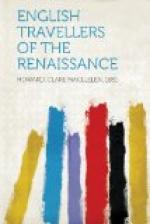The conception of travel one gathers from Fynes Moryson is that of a very exciting form of sport, a sort of chase across Europe, in which the tourist was the fox, doubling and turning and diving into cover, while his friends in England laid three to one on his death. So dangerous was travel at this time, that wagers on the return of venturous gentlemen became a fashionable form of gambling.[196] The custom emanated from Germany, Moryson explains, and was in England first used at Court and among “very Noble men.” Moryson himself put out L100 to receive L300 on his return; but by 1595, when he contemplated a second journey, he would not repeat the wager, because ridiculous voyages were by that time undertaken for insurance money by bankrupts and by men of base conditions.
Sir Henry Wotton was a celebrated product of foreign education in these perilous times. As a student of political economy in 1592 he led a precarious existence, visiting Rome with the greatest secrecy, and in elaborate disguise. For years abroad he drank in tales of subtlety and craft from old Italian courtiers, till he was well able to hold his own in intrigue. By nature imaginative and ingenious, plots and counterplots appealed to his artistic ability, and as English Ambassador to Venice, he was never tired of inventing them himself or attributing them to others. It was this characteristic of Jacobean politicians which Ben Jonson satirized in Sir Politick-Would-be, who divulged his knowledge of secret service to Peregrine in Venice. Greatly excited by the mention of a certain priest in England, Sir Politick explains:
“He has received weekly
intelligence
Upon my knowledge, out of
the Low Countries,
For all parts of the world,
in cabbages;
And these dispensed again
to ambassadors,
In oranges, musk-melons, apricocks—,
Lemons, pome-citrons, and
such-like: sometimes
In Colchester oysters, and
your Selsey cockles."[197]
Later on Sir Politick gives instructions for travellers:
“Some few particulars
I have set down,
Only for this meridian, fit
to be known
Of your crude traveller....
First, for your garb, it must
be grave and serious,
Very reserv’d and lock’d;
not tell a secret
On any terms; not to your
father: scarce
A fable, but with caution:
make sure choice
Both of your company, and
discourse; beware
You never speak a truth—
PEREGRINE. How!
SIR P. Not to strangers,
For those be they you must
converse with most;
Others I would not know, sir,
but at distance,
So as I still might be a saver
in them:
You shall have tricks eke
passed upon you hourly.
And then, for your religion,
profess none,
But wonder at the diversity
of all."[198]




